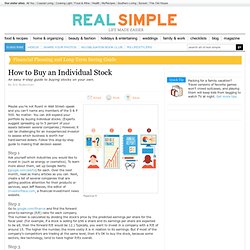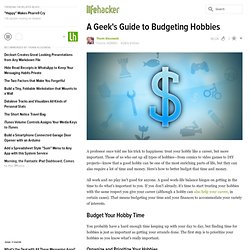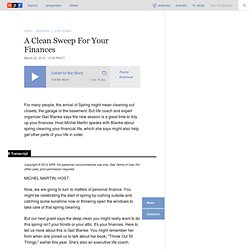

How to Buy an Individual Stock. Maybe you’re not fluent in Wall Street–speak and you can’t name any members of the S & P 500.

No matter: You can still expand your portfolio by buying individual stocks. (Experts suggest spreading up to 5 percent of your assets between several companies.) However, it can be challenging for an inexperienced investor to assess which business is worth her hard-earned dollars. Follow this step-by-step guide to making that decision easier. Step 1. The Stupid Things You Do with Your Money (and How to Fix Them) Stupid Thing #6 - you buy new.

Buying a new car is throwing money away. The depreciation on a new car is staggering, losing nearly 25% within 5 days. Never buy new. Buy 2 year old lease turn ins if you must drive something that looks new, or buy a good used car that has great reviews after others have already owned them a few years. Example: I just bought a Jeep Grand Cherokee used. MY motorcycle is used, Bikes lose value fast, Even the Harley's will lose most of their value in the first 6 months of ownership. Finally, my home is used. Yes this works for other items. Even my new ipad is Used. Top 10 Secret Agent Security Tips and Tricks. When dealing with computer security, an often overlooked security risk is so-called "deleted files".

When files are deleted, nothing is actually done to them aside from marking them as "free-space". The OS may get around to overwriting them sometime when it needs the space, but a deleted file could sit on a drive completely intact for weeks of usage (the bigger it is the bigger the chance it will be at least partially overwrited).
Encryption applications that do not involve real-time decoding (a special driver decrypting files on-the-go vs an application decrypting and re-encrypting files), often do not have secure methods of wiping files (or the user is unaware of them), and hence the files are left in an unencrypted state on the drive when deleted. The only way to assure deleted files remain that way (or at least make their recovery very difficult and time-consuming) is to have an application overwrite the drives free-space with random 0s/1s, ideally multiple times. Automate Your Finances to Spend Less Time Managing Your Accounts. A Geek's Guide to Budgeting Hobbies. A professor once told me his trick to happiness: treat your hobby like a career, but more important.

Those of us who eat up all types of hobbies—from comics to video games to DIY projects—know that a good hobby can be one of the most enriching parts of life, but they can also require a lot of time and money. Here's how to better budget that time and money.P All work and no play isn't good for anyone. Take a Day Off and Put Yourself Through Financial Boot Camp. Organize Your Finances This Weekend (and Stop Wasting Money) If I care enough to be OCD about things, I'll put fast food as anything that has some kind of simple, regularly used system in place for grabbing food and leaving, including pizza places.

Sit-down restaurants I put into restaurants, including things like Denny's or even Chinese food (where carry-out is certainly possible, but isn't the norm) (except for Panda Express). You could also base it off of how you spent time there. You could call a steak house fast food if you grabbed it and left or Panda Express a restaurant if you were doing it for a lunch with friends or to kill some time before a movie or whatever. Or you could just do neither and throw everything into a generic Restaurant label. It's all about what works for you and what level of detail YOU want.
And yes, it is a hassle to do every transaction, especially when you get behind. A Clean Sweep For Your Finances. Copyright © 2012 NPR.

For personal, noncommercial use only. See Terms of Use. For other uses, prior permission required. Now, we are going to turn to matters of personal finance. You might be celebrating the start of spring by rushing outside and catching some sunshine now or throwing open the windows to take care of that spring cleaning. But our next guest says the deep clean you might really want to do this spring isn't your blinds or your attic.
Welcome back. GAIL BLANKE: I'm so glad to be with you. MARTIN: Now, we talked to you about throwing out 50 things a little while ago, but you also told us that you want to check some things off your financial list this spring, as well. BLANKE: You know, I think, in general, what builds up over the year - I call it life plaque that clogs the arteries of our lives and weighs us down, holds us back, curbs our enthusiasm, all that stuff. MARTIN: Well, how would you get started, if you decided - yeah, that's me? So how would you start? OK.